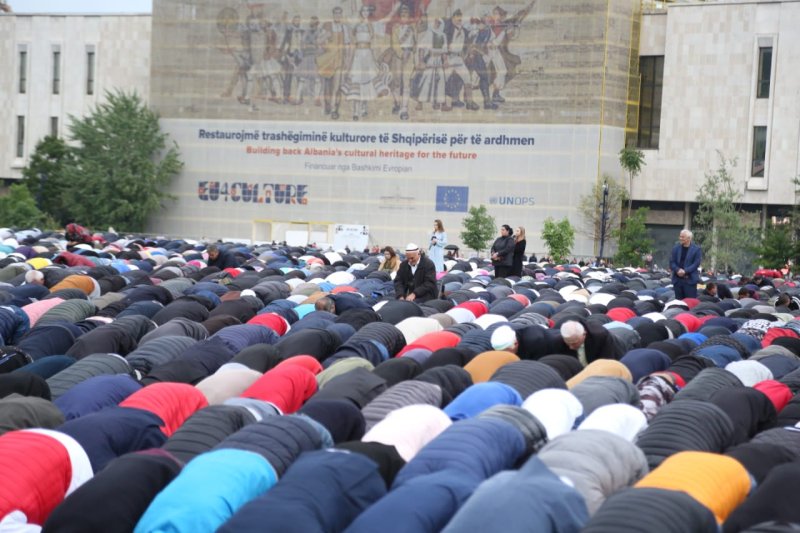Albania, Thousands Celebrates Eid al-Fitr
Thousands of Albanians Muslim believers celebrated Monday the Eid al-Fitr, or the Feast of Breaking the Fast that comes after a month of fasting between dawn and sunset.
They prayed in the 'Skanderbeg' Square in capital at 06:20 am.
One of the key elements of Eid is the concept of Zakat al-Fitr, which obliges Muslims who can afford it to make a donation in cash or food to allow the less fortunate to celebrate Eid.
Eid al-Fitr is often called the “Festival of Breaking the Fast.” The practice of dawn-to-sunset fasting during the holy month of Ramadan ("Sawm") is one of the five pillars of Islam. Muslims believe that it was during the month of Ramadan that the text of the Qur'an was revealed to the Prophet Muhammad.
Muslims celebrate Eid Al-Fitr with prayers called "Salat Al Eid" in Arabic. There is no audible call to prayer for the Eid prayers. Muslims will gather in mosques or open spaces and offer two units of prayer – called "Rakat". The prayers are followed by a sermon, in which the imam asks for forgiveness, mercy, and peace for every being across the world.
It's a tradition to wear new clothes and on the way to the mosque, eat something sweet such as a date, and recite a small prayer called a takbeer.
Other key elements of the Eid celebrations are giving money to the poor (known as 'Zakat al-Fitr', the amount to be given depends on the possessions someone has), sending Eid greetings and feasting with families.
For many Muslims, Eid al-Fitr is a festival to show gratitude to Allah for the help and strength he gave them throughout the month of Ramadan to help them practice self-control.
The phrase commonly used by Muslims as a greeting on this day is “Eid Mubarak”, which is Arabic for 'blessed festival'. The proper response to Eid Mubarak is "Khair Mubarak", which wishes goodness on the person who has greeted you.
The first Eid al-Fitr was celebrated in 624 CE by the Prophet Muhammad and his companions after their victory in the battle of Jang-e-Badar, a turning point in Muhammad's struggle with his opponents among the Quraish in Mecca during in the early days of Islam.
Eid al-Fitr may also be called 'Feast of the Lesser Bairam, Bairam being a Turkic word for holiday. It may seem odd that the word lesser is used for such a widely celebrated festival, the reason is that the 'Greater Bairam' is Eid al-Adha, the other great Islamic festival which is seen as the holier of the two.













